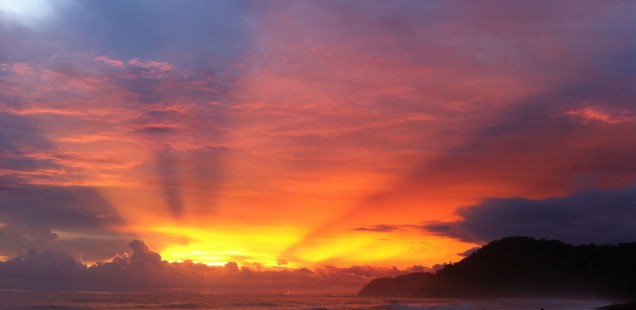
Happiness
Today is my birthday. As I write this, Heather is reminding me that I should step away from the computer and have fun instead of focusing on a blog that “no one is making me write” anyway. Since I am actually going to take her advice, this is going to be a short entry. It’s ironic that I was planning on writing about happiness and how you can control your own happiness to an extent, while constructing a self-imposed deadline which is unnecessarily stressing me out.
We’ve been in Costa Rica for a little over three months now. At this point, we can safely declare that all of our planning has paid off. To say we thought of everything would be inaccurate since that is virtually impossible to do. But our time here thus far couldn’t have gone much smoother. We have already been exposed to numerous firsthand accounts which shed light on how badly this experience could have unfolded without an abundance of planning. As with anything, however, it is completely doable with meticulous research and preparation. So, despite what an embarrassingly chaotic scene the last few days of leaving Pittsburgh was, we have had a relatively easy transition here. That ease has allowed us to attain one of our main objectives for this sabbatical and in life. Happiness.
Even though students are told during law school that they are being put through the “Socratic method” of learning, it is a misnomer. Based on the writings of Plato, the teaching method of Socrates was a process of questioning designed to expose ignorance, thus clearing the path to true knowledge. You can be the judge as to whether attorneys, who have indeed gone through three years of law school, have reached the level of moral and intellectual enlightenment Socrates envisioned.
I mention Socrates in this entry because he is someone who thought a lot about happiness. Even though I have a degree in Philosophy, I don’t consider myself an authority on the subject. In fact, it’s still not clear to me where the beliefs of Socrates end and those of Plato begin. Here’s what I think I know.
With respect to Western philosophy, Socrates is credited with introducing the concept that happiness is attainable through human effort. Prior to Socrates, happiness was viewed as something reserved only for the Gods, and seeking it was seen as hubris. Socrates came along and argued that happiness was the end goal in and of itself, and leading a just, virtuous, and ethical life would bring a person closer to happiness.
As Americans, we are familiar with the concept of happiness since it is included in one of our most important historical documents. Thomas Jefferson, who was influenced by a number of philosophers, references happiness twice in the U.S. Declaration of Independence. Not only does he list the “pursuit of happiness” as an unalienable right, he also mentions it in the context of the right of the people to institute a government which will have a positive impact on the happiness of its citizens.
My point is that contemplating happiness is not something about which you should feel guilty. It is not a luxury to be reserved only for a particular class of people. It is not a new subject that came about in the age of self-help books and daytime talk shows. It is a concept fundamental to our humanity, one that individuals have pondered for thousands of years. Thus, it is not selfish, egotistical, or weak to honestly look at your life and ask yourself if you are truly happy. If you conclude you are not, then the next question should be, “what steps can I take to achieve happiness?”
Going through that simple exercise is what started us on the path of doing a family sabbatical in Costa Rica. In an earlier post, I mentioned that I didn’t know yet if Costa Rica’s “pura vida” term was a gimmick or something real. At least in the coastal towns, I’m leaning towards the conclusion that it is indeed genuine. Even though the U.S. Declaration of Independence arguably makes happiness a cornerstone of our democracy, it’s not something we constantly and openly discuss or even ponder. Furthermore, I know that quantifying happiness is difficult, but by most measurements, the U.S. is not in the top 10. In fact, you’ll notice that the top 10 countries on this happiness list do not coincide with the top 10 wealthiest countries in the world. I’m not saying that money doesn’t matter. It does. Implying otherwise is an insult to people worldwide who are struggling simply to make ends meet. At the same time, it’s far from the only factor that determines happiness.
I’ve never been in a country where happiness seems to be a part of the collective conscience of the culture as much as Costa Rica. It’s almost like each time Costa Ricans say “pura vida” to each other, it’s a reminder to one another to step back from the situation, prioritize what is important in life, and then proceed. Granted, this perspective has its drawbacks. We’ve met numerous business owners who have had employees not show up for work whose excuses all essentially boiled down to “pura vida”. Or, there is the personal example of how a conversation went down when I inquired about a bridge we drive on each day. Me: “This bridge looks like it is going to fall into the water if one more large truck drives over it. How soon is it going to be repaired?” Costa Rican worker in response to my question: “Si. Pura vida.” Clearly, there is a downside. But, by and large, keeping in mind what is truly important in life is a healthy way to lead it. Although I’m slowly getting better at this skill, I am far from mastering it.
In fact, my wife just reminded me of how not good I remain at this prioritization thing. As she tells it, I almost caused an international incident at the border of Panama a few days ago as I rambled on about bureaucracies, senseless inefficiencies, and indifferent workers. Luckily, my Spanish still sucks and all of that was in English. I’m thinking the border agents got the gist of my perspective from my body language (not that they would care at all about my opinion). Fortunately for my family, we were still able to enter into Panama from Costa Rica despite my ranting.
There are periodic challenges here, but we’ve been extremely content thus far. This is in part because many of the incidents that could have happened to us have not. We’d like to think this is due to the effort we put into planning every facet of this experience. But maybe it has a little to do with good fortune as well. Above all, we’re ecstatic to have the time to spend with loved ones, even if I just told Heather to please take the kids the hell out of the house so I could finish this in peace. Aside from having quality family time, the other reason we are so happy is that this country is absolutely stunning. Have you seen the pictures?
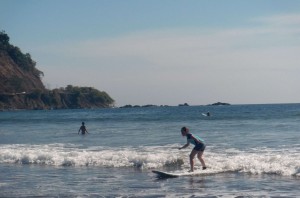
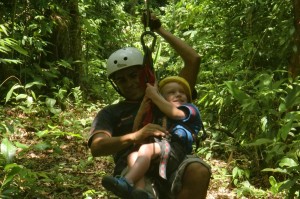

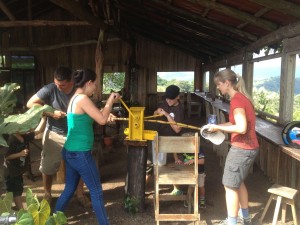



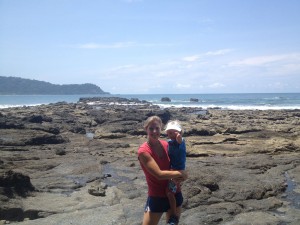
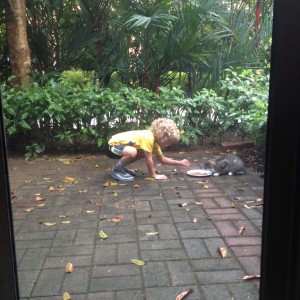
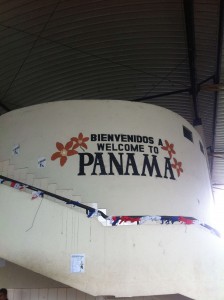
Jamie,
Thanks for the blog, very interesting.
Thanks for reading!
Happy Birthday Jamie! I appreciate your thoughts. Pursuit of happiness is a beautiful thing. Of interest to me, is how the definition of “happy” continues to change and morph. The gift is that it is not a singular pursuit for you. You have people that you love on this journey with you. Bravo!
My birthday wish for you is continued love and much happiness!
Very well said, Pam.
Happy Birthday Jamie and another wonderful post!
Thanks again, Sandra. It was a birthday I’ll remember.
Really enjoying your posts. What an adventure for you all!
That’s nice to hear. Yes. “Adventure” is the correct term. If I documented all of the stuff that happens each day (good and bad), I wouldn’t have time to actually live it.
Oh my goodness I came across this while looking for something concrete about Tres Piscinas to send my friend! It came up first in line when searching images. As I was reading I realized, hey wait, I know them! Hope you are all well – we miss you!
Hey, Sara. We miss you too. We’re going to do our best to visit in 2024. We’d love to see you, so we’ll definitely let you know if we’re headed your way. I hope your family is doing well. Please tell everyone we say hello.